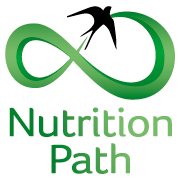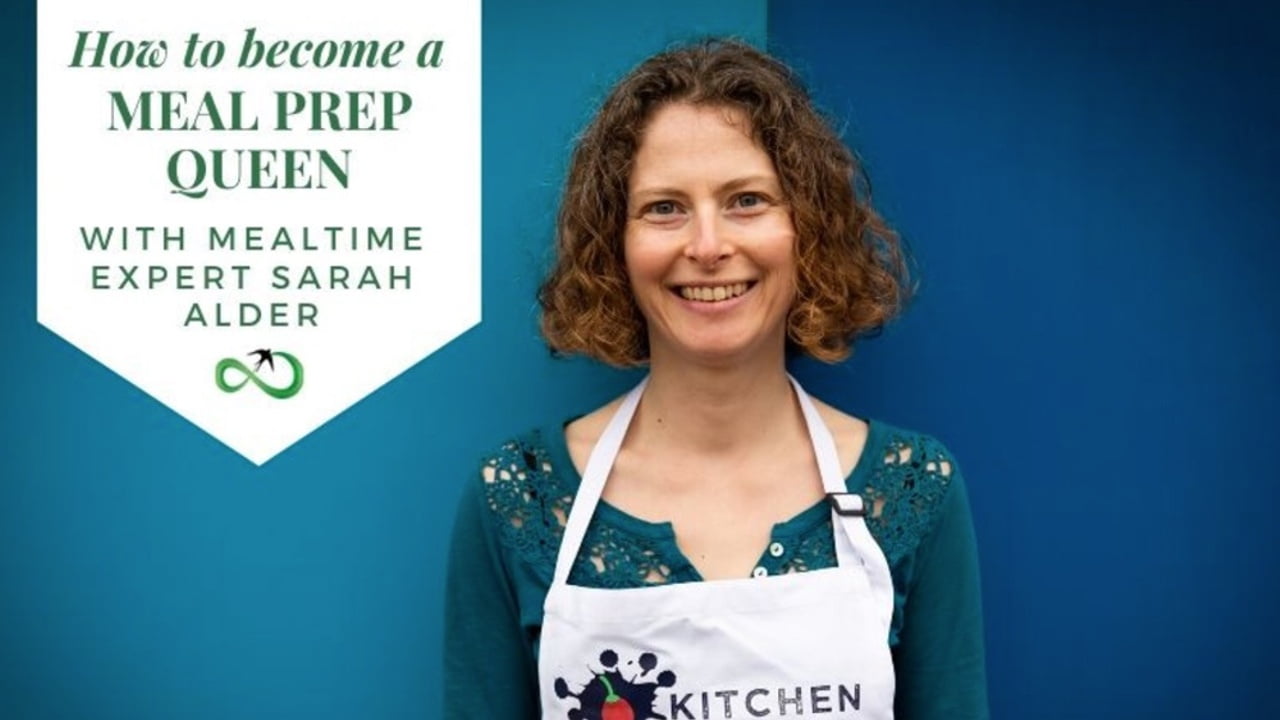The pandemic meant that I’m spending more time cooking meals, thinking about what to cook and spending my free time getting through the mountain of washing up. Plus, my food bill has been slightly higher than usual, but I’m kind of OK with that.
The truth is that I have probably eaten the most nutritious, delicious and nourishing food I have for months and meal times are longer and more enjoyable. But the story would be very different if I couldn’t count on the magic of meal planning and meal prep.
All my clients know that I’m a big fan of getting resourceful in the kitchen, counting on meal-planning and meal-prep to reduce stress and anxiety, save money and reduce food waste.
This week I’m speaking with Sarah Alder from Kitchen Titbits all things relating to food, kitchen and making meal-prep work for you.
What inspired you to get serious about meal-planning and teach others to do the same?
I hate standing peering into an open fridge, when hungry, trying to work out what to cook. Even as someone who cooks all the time and works with food for a living, when I’m that hungry that I just need to eat and I’ve got my children snapping at my ankles for food, my mind goes blank, hanger sets in, the food I produce isn’t satisfying and in all likelihood, isn’t the best nutritionally for me and my family.
I much prefer to have a plan and to know that I have the right ingredients to hand to cook some tasty meals across the week which are going to include a good variety of foods. I’m not trained in nutrition but I have a good understanding of eating well and I know how much better my body feels when I have eaten a good range of foods.
What’s more, if I plan meals, I know that my two fussy eater children are going to have every opportunity to get a range of foods into their diet, to be exposed to and become more familiar with a wide range of ingredients, which will all work towards reducing their fussy eating habits.
And, meal planning has the added bonus of saving me money on my shopping, cuts my food waste, reduces my stress levels and saves me time and energy in the kitchen.
I was very lucky to grow up learning to cook, shop and make the most of the limited food available, spending time in the kitchen with my mum and grandma picking up fundamental life skills which so many people are not learning any more, either at home or at school.
I started Kitchen Titbits because I wanted a way to be able to share my knowledge and passion for all things in the kitchen and to be able to help people learn the skills which will enable them to afford to save for a mortgage, provide for their families, reduce their impact on the environment and eat better.
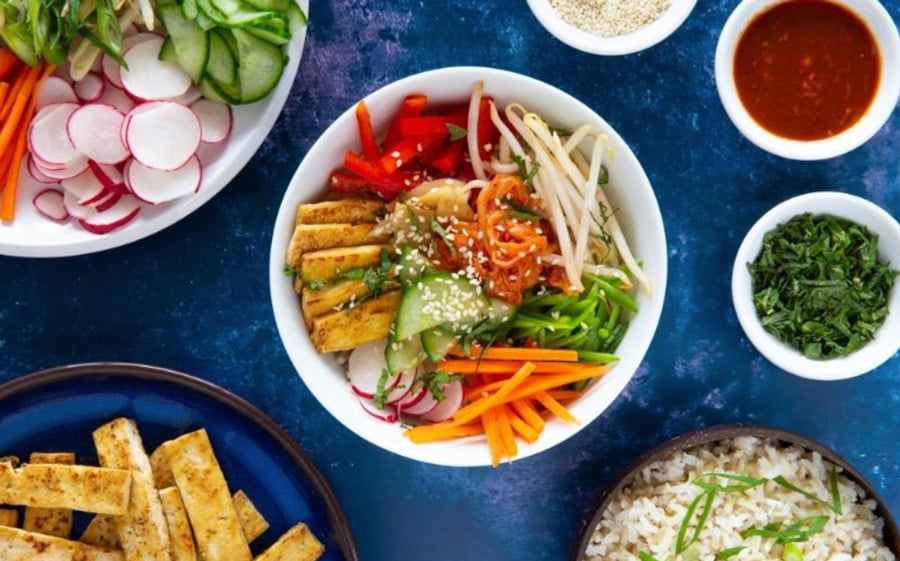
Do you have any tips for somebody, who’s never done meal-planning before? Where do you start?
Schedule some time in your calendar to do the planning so that it happens. Starting to a meal plan is about creating a new good habit and like any habit you need to make time for it and work on it so that it becomes something you stick with. Also, with practice, it becomes quicker and easier.
Know what you've got that needs using up and use it as a starting point for your meal ideas. This will make getting started easier but will also ensure you're cutting the waste.
Check your calendar and know what you've got going on and how many mouths you have to feed.
Plan dinner first. Dinner leads to leftovers or gives you the chance to think about what you're making and what you could cook extra of which can contribute to lunch the next day or be the starting point for dinner another day in the week.
Grab a pen and paper, your wall calendar, a seven-day meal plan template, your laptop or your phone and make a start- stop putting it off!
What could you recommend to keep varying the foods if somebody isn’t creative in the kitchen?
An easy way to start adding variety and new foods into your repertoire is to pick one vegetable, or other ingredient, that you wouldn’t normally buy and add it to your weekly shop. Each week, add another new vegetable or ingredient. This way it doesn’t feel daunting and you slowly get used to cooking with the new ingredients.
If you’re stuck for inspiration, there are lots of recipes on my website but sites such as Delicious or Olive magazine, Sainsbury’s or Waitrose are excellent places to look since you can search by ingredient, the recipes are, on the whole, simple and are reliable.
I know you’re a big advocate of keeping food waste to the minimum. Do you have some secret hacks to help reduce waste you could share with me?
The biggest hack is meal planning! By planning your meals, you can be thinking about the ingredients you’ve already got that need using up but also how you’re going to make the most of the ingredients you buy, especially something like a large cabbage which is going to last more than one meal.
Another way to reduce waste is to store food promptly and appropriately. By storing foods in the right way, they’ll last longer. Herbs and salad leaves can be wrapped in damp kitchen towel and stored in a lidded container to prolong their life. Bread can be turned into breadcrumbs, dried out in a low oven and stored in an airtight container for months longer than they would last in the freezer. Potatoes can be stored for longer in a cotton bag and away from onions whilst tomatoes will last longer in the fridge (bring them out a few at a time as you use them because they taste better at room temperature).
Make best use of your freezer space for buying frozen produce, freezing leftovers but also for freezing anything that might go to waste - a half bottle of milk before you go away on holiday, the remains of a tin of tomatoes or some overripe fruit.
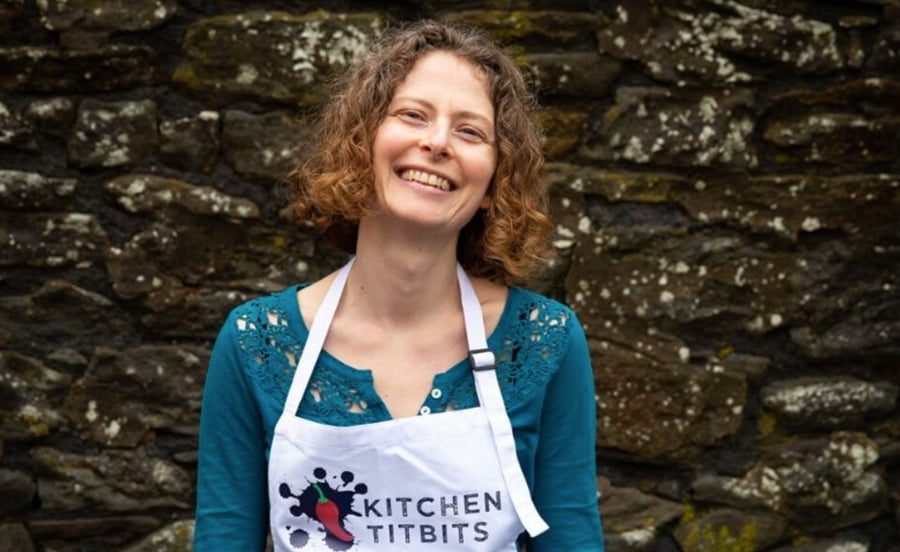
What are your current top 3 favourite quick lunch meals to make?
I rarely make anything specific for lunch, instead I plan to have leftovers - that might be leftovers of a whole meal or it might be a collection of leftovers from various meals where I have prepared extra of some ingredients, such as lentils, bulgar wheat and roasted vegetables and combine it with some halloumi or feta, or perhaps some falafel or even leftover meat or fish, some fresh herbs and salad bits, maybe some avocado or houmous, and a punchy dressing. I can pick and mix to create a delicious salad bowl which would cost me a fortune in a nice cafe!
If you’re not one for free-styling, this Bibimbap (Korean rice bowl) recipe is just the sort of thing which I would throw together from whatever I can lay my hands on!
If I were to purposely prepare lunch, I would likely choose something like this smoked mackerel salad which I could take with me in a lunch box if needed, pouring over the dressing when I’m ready to eat.
And, at home over the winter, I’d likely make a soup. This spiced red lentil soup is one of my favourites since it makes use of cheap, store cupboard staples and is quick to cook. Sometimes, I’ll include carrot or spinach to ring the changes and to get some extra veggies in.
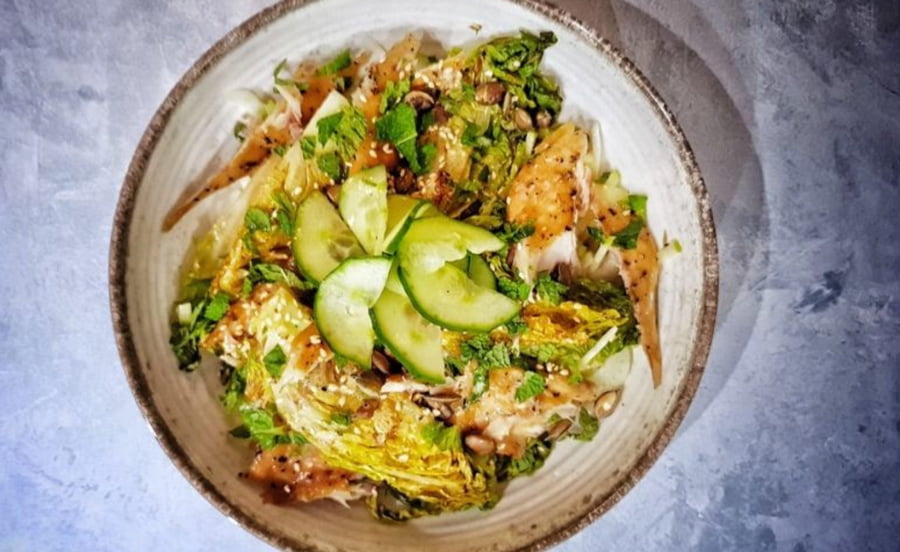
Could you share any star ingredients that you use in your kitchen that are often overlooked?
Two of my star ingredients are frozen berries and spinach, which you’ll always find in my freezer.
Keep fresh spinach for salads and make use of frozen spinach in your cooking. A bag of fresh spinach will cook down to nothing yet frozen spinach gives you bulk and will save you a fortune. Plus, there’s less likely to be any waste since you can use just what you need when you need it.
You can grab a cube or two as you need them or throw a huge handful into whatever you’re cooking. Defrost for a minute or so in the microwave or add to a dish towards the end of cooking and it will keep its vibrant green colour.
Frozen berries are brilliant for porridge, overnight oats, smoothies, yoghurt and pancakes. They cost a fraction of the price of fresh berries and mean you can have seasonal produce, at it’s best, all year round.
Thanks so much, Sarah!
P.S. I’m a big fan of frozen berries too!
Sarah Alder of Kitchen Titbits is a meal planning and family mealtimes expert. She helps transform mealtimes from stressful to stress-free, teaching people to save money on their food bills, reduce their food waste, prepare meals the whole family will enjoy and help them support their fussy eaters to have a positive relationship with food and to increase the number and variety of foods they’ll eat.
To find out more about Sarah, her courses, workshops and her online programmes, visit her website or follow her on Instagram, Facebook or Twitter.
As well as teaching how to meal plan easily and efficiently, Sarah offers a meal plan service so if you aren't keen to do your own meal planning, you can buy a one-week store cupboard meal plan from her website.
